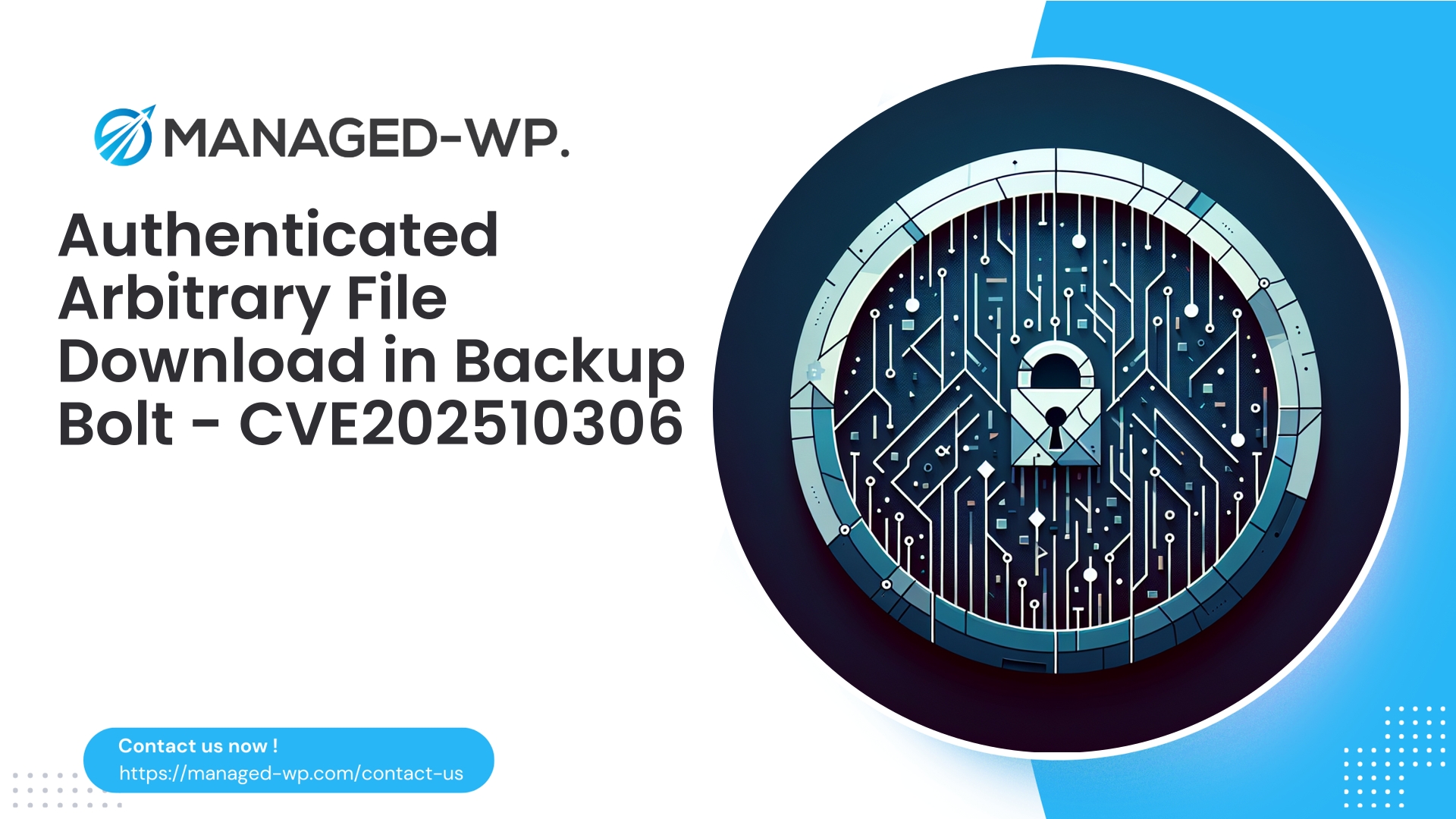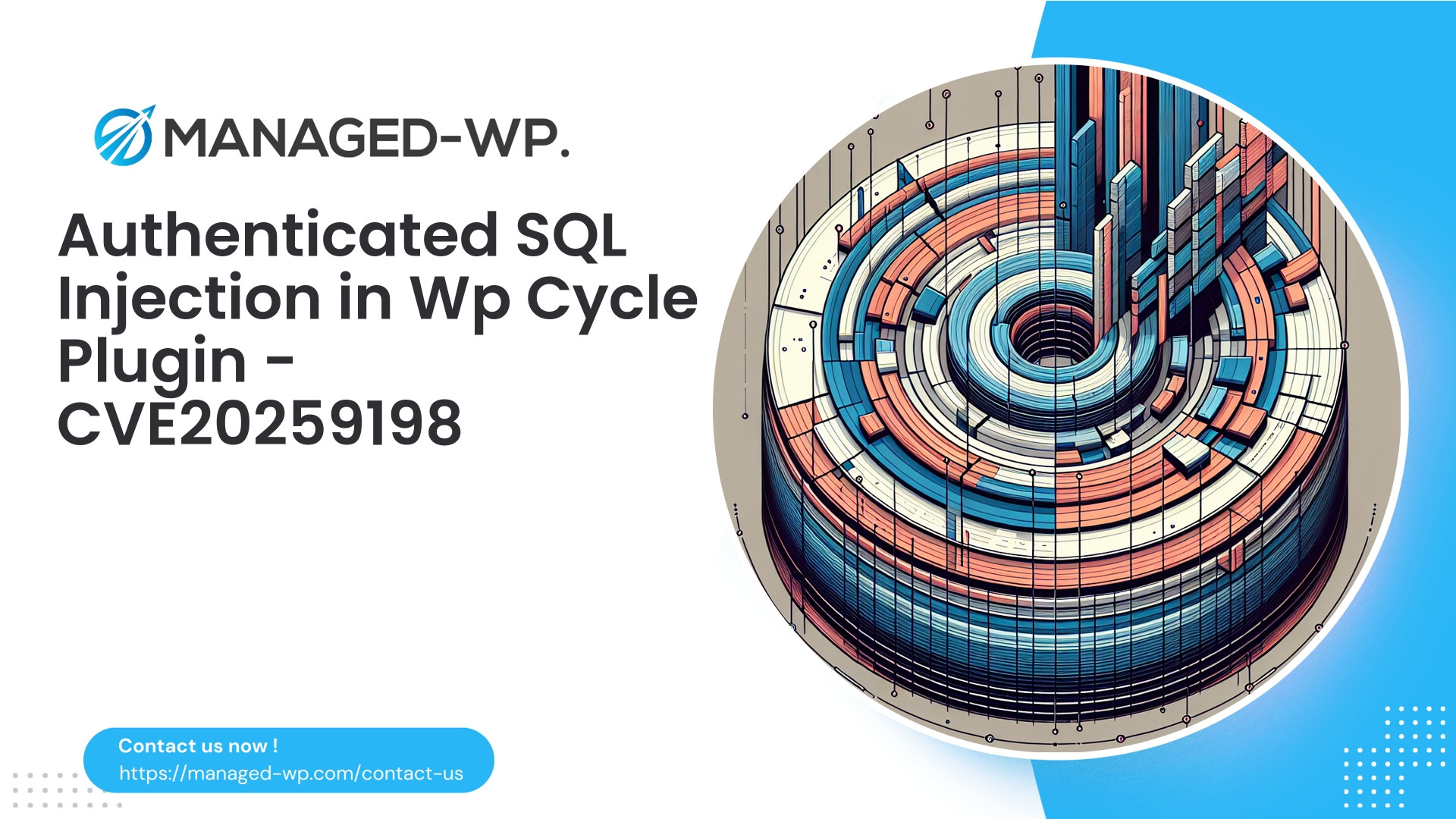| 插件名称 | Meks简易地图 |
|---|---|
| 漏洞类型 | 已认证存储型 XSS |
| CVE编号 | CVE-2025-9206 |
| 紧急 | 低的 |
| CVE 发布日期 | 2025-10-03 |
| 源网址 | CVE-2025-9206 |
Meks Easy Maps <= 2.1.4 – 已认证贡献者存储型 XSS 漏洞 (CVE-2025-9206):WordPress 网站所有者的紧急指南
来自 Managed-WP 美国安全专家的权威分析:详细的技术背景、攻击途径、检测方法、立即遏制措施和长期补救策略——以及我们的免费保护计划如何在响应期间保护您的网站。
作者: 托管 WordPress 安全团队
日期: 2025-10-04
重要的: 本安全公告由 Managed-WP 安全专家发布,旨在剖析近期披露的 WordPress 插件“Meks Easy Maps”(版本 2.1.4 及更早版本,CVE-2025-9206)中存在的已认证存储型跨站脚本 (XSS) 漏洞。我们的目标是为网站管理员和托管服务提供商提供可操作的情报,以便进行风险评估、快速缓解和强大的网站加固。如果您的基础架构中启用了此插件,则必须立即采取措施。
执行摘要
Meks Easy Maps 插件(版本 2.1.4 及更早版本)存在一个经过身份验证的存储型跨站脚本攻击 (XSS) 漏洞,允许具有“贡献者”或更高权限的用户注入恶意 HTML/JavaScript 代码。该恶意代码会被插件存储,并在管理员或任何网站访问者访问受影响内容时执行。此漏洞的 CVE 编号为 CVE-2025-9206,CVSS 评分为 6.5,表明其风险等级为中等。虽然利用此漏洞需要经过身份验证的访问权限,但低权限帐户经常会被盗用或恶意创建,因此该漏洞是一个可靠的攻击途径。潜在的后果包括帐户被盗用、网站被持续篡改、恶意 SEO 注入,甚至横向移动至整个网站被完全控制。
使用此插件的网站所有者应优先考虑通过实施虚拟防火墙保护、审核存储的插件数据、限制贡献者角色权限、轮换凭据以及在进行大量数据修改之前准备经过验证的备份来控制风险。
为什么这个漏洞很重要
存储型跨站脚本攻击 (XSS) 是指已认证用户提交的恶意脚本未经过滤保存,并在其他用户的浏览器中渲染时发生的攻击。在这种情况下,贡献者或具有更高权限的用户可以将恶意脚本嵌入到地图相关字段(例如标记、信息窗口、标题)中。当管理员或前端用户查看这些字段时,脚本就会执行,从而可能导致以下后果:
- 窃取登录会话 cookie、授权令牌或 CSRF 令牌。
- 使用其他用户的凭据执行未经授权的操作(例如,创建帖子、更改配置)。
- 加载远程有效载荷以进行持续入侵或篡改。
- 注入隐藏链接或垃圾内容以损害搜索引擎优化和声誉。
由于这些内容会永久存储,因此威胁会一直存在,直到恶意数据被完全删除。
哪些人会受到影响?
- 运行 Meks Easy Maps 插件版本 2.1.4 或更早版本的网站。
- 允许用户注册成为贡献者或更高内容角色的安装程序。
- 管理员或编辑查看渲染插件数据的页面(前端或后端)。
如果您不使用此插件,目前除了保持良好的安全习惯外,无需采取任何直接措施。
技术概述
- 漏洞: 存储型跨站脚本攻击(XSS)
- 受影响组件: Meks Easy Maps 中接受和显示用户内容但未正确输出编码的字段。
- 所需权限: 拥有“已认证贡献者”或以上角色。
- CVE标识符: CVE-2025-9206
- 攻击向量: 恶意 JavaScript 代码被存储,并在被查看时执行。
- 地位: 目前尚无官方厂商提供的补丁。
潜在攻击场景
- 贡献者插入恶意地图标记: 贡献者用户在标记信息字段中放置了脚本。管理员查看页面时,不慎执行了该代码。
- 利用内容提交 API: 攻击者利用贡献者可以访问的 REST 或 AJAX 端点直接注入脚本。
- SEO滥用: 脚本载荷会注入垃圾链接,降低网站搜索排名和安全性。
- 权限提升: 攻击者窃取管理员会话信息后,会创建后门或提升权限以获得网站的完全控制权。
关于CVSS评分
CVSS 3.1 基本评分为 6.5,表明该漏洞属于中等严重程度。虽然经过身份验证的访问要求降低了风险(相比未经身份验证的攻击),但持续的脚本执行和广泛的影响仍需紧急修复,尤其是在管理员活动频繁的网站上。
立即响应指南
请立即采取以下步骤,以减少接触并开始补救措施:
- 启用维护模式以减少对访客的影响。
- 如果无法访问,请通过 WordPress 管理插件页面停用 Meks Easy Maps 插件,或者通过 FTP/SFTP 重命名其文件夹(
wp-content/plugins/meks-easy-maps到meks-easy-maps.已禁用). - 暂时禁用或限制新用户注册,并降低贡献者角色权限。
- 审核具有“贡献者”或更高权限的用户帐户,以检测可疑个人资料;强制高级用户重置密码。
- 在进行任何结构更改之前,请备份您的整个网站:数据库和文件。
- 使用数据库查询(例如,)搜索插件数据和元字段中的可疑脚本
像'%'). - 使用可靠的过滤机制导出可疑记录并清理或删除恶意内容。
- 查看访问日志,查找与注入内容相关的异常行为或来源。
- 如果发现管理员会话被入侵或存在后门的迹象,应立即隔离站点并考虑采取全面的事件响应措施。
- 对所有管理员和编辑帐户实施双因素身份验证(2FA)。
检测攻击指标
- 执行数据库查询以查找存储的脚本;查找破坏预期纯文本字段的 HTML 标签。
- 检查插件设置、地图数据条目以及管理后台和前端预览中是否存在意外脚本。
- 监控浏览器开发者控制台,查找可疑的网络活动或与地图渲染相关的错误。
- 定期检查计划任务和文件上传是否存在意外变更。
安全清理恶意存储脚本
清洁工作必须有条不紊、谨慎小心:
- 将嫌疑人记录导出到安全环境进行分析。
- 使用 WordPress 的清理功能,而不是简单的字符串删除:
wp_strip_all_tags()当不需要标记时,去除所有 HTML。wp_kses()或者wp_kses_post()仅允许安全的HTML。- PHP 中的数据清理示例:
- 始终对输出进行转义,例如
echo wp_kses_post($stored_content);为了确保安全渲染。 - 部署前,请在隔离环境中测试所有更改。
array( 'href' => true, 'title' => true, 'rel' => true, ), 'strong' => array(), 'em' => array(), 'br' => array(), 'p' => array(), 'ul' => array(), 'ol' => array(), 'li' => array(), ); $safe_content = wp_kses($raw_input, $allowed_tags); // 保存 $safe_content 而不是原始数据 ?>
防止 XSS 的开发者最佳实践
- 永远不要相信用户输入;对输入进行清理,对输出进行转义。
- 强制执行能力检查,例如
current_user_can('edit_posts')在处理数据之前。 - 利用 nonce 并在服务器端验证它们(
wp_verify_nonce). - 执行严格的消毒程序(
sanitize_text_field(),wp_strip_all_tags(), 或者wp_kses())根据现场要求。 - 正确转义所有输出:
- 具有属性
esc_attr() - 带有 URL 的
esc_url_raw()保存和esc_url()输出 - HTML
wp_kses_post()或者esc_html()
- 具有属性
- 使用预编译的数据库语句(
$wpdb->prepare())防止注射。 - 限制存储内容的最大长度。
- 避免在管理界面中回显原始 POST 或 GET 数据。
- 开发用于检测注入模式的自动化测试。
Managed-WP 的 Web 应用程序防火墙 (WAF) 如何提供帮助
在官方插件更新发布之前,WAF 提供至关重要的“虚拟修补”功能——在恶意请求到达易受攻击的代码之前将其拦截并阻止。针对这种特定的存储型 XSS 漏洞:
- WAF 会阻止包含针对插件端点或 REST 路由的典型 XSS 有效负载签名的 POST 或 PUT 请求。
- 移除或清理参数中不允许的 HTML 标签,例如
地图信息或者标记描述. - 限制贡献者角色帐户提交包含脚本或 HTML 标签的内容。
- 允许进行调整以减少误报,同时最大限度地提高保护覆盖范围。
Managed-WP 采用分层防御策略,将通用 XSS 启发式方法与插件特定的适应性和行为分析相结合,以应对异常的低权限活动。
WAF规则逻辑的概念示例
- 阻止对
/wp-admin/admin-ajax.phpPOST 参数(标记描述,信息窗口,地图标题包含脚本模式(例如,<\s*script\b,on\w+\s*=,javascript:). - 阻止提交带有 URL 编码或 base64 编码脚本有效负载的内容(例如,
%3Cscript%3E,;). - 防止 JS 事件处理程序注入,例如
错误=,点击=, 或者onload=任何形式的数据。 - 强制执行基于角色的限制,阻止来自贡献者帐户的脚本有效载荷,并记录所有被阻止的尝试以进行取证审计。
笔记: WAF 规则需要针对有效用例进行严格测试,以最大限度地减少误报并建立有效的警报机制。
如果您怀疑您的网站已被入侵,请采取以下应对措施
- 保存取证证据:创建相关时间段内的文件、数据库的完整备份,并导出 Web 服务器日志。
- 将站点隔离,切换到维护模式或离线状态,直到修复完成。
- 轮换所有关键凭据(管理员、数据库、FTP/SFTP、主机控制面板),并使活动会话失效。
- 检查上传的文件和插件是否存在未经授权的修改或 Web Shell。
- 从经过验证的来源重新安装 WordPress 核心程序、主题和插件。
- 如果对彻底清除数据有疑问,请使用干净的备份进行重建,仅恢复经过验证的内容。
- 如果业务连续性或法律合规性受到影响,请寻求专业的事件响应支持。
长期安全加固
- 严格限制用户角色;仅授予贡献者必要的最低权限。
- 实施注册审核机制和验证码,以阻止虚假账户。
- 要求所有特权用户启用双因素身份验证(2FA)。
- 保持 WordPress 核心、主题和插件的最新版本;订阅漏洞警报。
- 部署托管式 WAF/虚拟补丁服务,以防止零日漏洞攻击。
- 建立完善的备份流程,包括异地存储和定期恢复测试。
- 制定并演练事件响应计划,详细说明关键角色、沟通和证据保存。
快速事件检查清单
- 停用或重命名 Meks Easy Maps 插件文件夹。
- 启用维护模式。
- 审查所有具有“贡献者”或更高角色的用户。
- 强制管理员和特权帐户重置密码。
- 修改前请备份数据库和文件。
- 扫描数据库
<script>标签或可疑内容。 - 导出分析后,对恶意条目进行清理或删除。
- 扫描文件系统,查找未经授权的文件或后门。
- 一旦有修复后的插件版本可用,请重新安装。
- 确认修复并重新扫描后,才能重新启用插件。
给房东和网站管理员的建议
- 为客户提供主机或网络边缘的虚拟补丁服务。
- 建立简化的流程,以便在响应期间暂停受影响网站上的插件。
- 对用户进行低权限用户内容注入风险方面的教育。
- 提供流量日志和安全恢复点的访问权限,以支持调查。
负责任的信息披露和供应商时间表
目前尚无官方补丁,因此漏洞披露需要安全研究人员、供应商和网站所有者之间的协调配合。预计会有一段时间,虚拟补丁和缓解措施可以提供临时保护。请密切关注官方渠道,并在供应商发布更新后立即应用。
为什么仅靠自动扫描远远不够
自动化扫描器和特征库虽然是有用的工具,但缺乏全面识别风险所需的特定站点上下文信息——尤其对于仅在特定视图中显示的存储漏洞而言更是如此。结合人工审查、通过 Web 应用防火墙 (WAF) 进行虚拟修补以及持续监控,可以显著提高抵御漏洞利用的能力。
最后的想法
此次广泛使用的地图插件中发现的存储型跨站脚本攻击 (XSS) 漏洞再次印证了一个重要的教训:任何接受富文本内容的输入都必须假定攻击者意图恶意,无论用户角色如何。低权限账户可能使攻击者能够持续注入数据,从而导致严重后果。在官方补丁发布之前,采用虚拟补丁、保守的内容策略以及立即采取隔离措施可以显著降低风险。
如果您的环境运行了 Meks Easy Maps 插件,并且您尚未解决此问题,请务必将其列为首要任务。暂时禁用该插件,进行彻底的内容审核,并对所有用户生成的输入内容实施严格的保护措施。
使用 Managed-WP 保护您的 WordPress 网站——免费套餐现已推出
激活 Managed-WP 免费方案,即可快速有效地抵御 Meks Easy Maps 及类似插件的漏洞。此免费方案包含托管式 Web 应用防火墙 (WAF)、无限流量检测、核心 WAF 规则集、恶意软件扫描以及针对 OWASP Top 10 威胁的缓解措施。它能有效阻止常见的攻击模式,例如存储型 XSS 漏洞利用,让您可以安心进行清理并等待官方插件修复。
注册 Managed-WP 免费计划,即可获得即时边缘保护。
如需高级控制功能,请考虑从基本版(免费)升级到标准版(自动恶意软件清除和 IP 允许/拒绝功能)或专业版(详细报告、自动虚拟补丁、专用安全支持和高级附加组件)。
需要专家协助?Managed-WP 可执行有针对性的发现扫描,并立即部署虚拟补丁,以缩小您网站的攻击面。对于复杂情况或疑似主动入侵,我们的专业服务可提供全面的事件响应和修复支持。
感谢您与 Managed-WP 合作,共同加强 WordPress 安全性。如果您需要关于日志、查询或可疑内容审核方面的定制指导,请随时联系我们的安全团队。



















